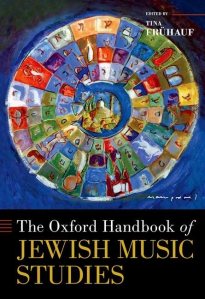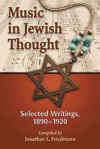You are currently browsing the tag archive for the ‘Ashkenazic’ tag.
The Oxford Handbook of Jewish Music Studies. Edited by Tina Frühauf. Oxford and New York: Oxford University Press. 2023.
Reviewed by Paul G. Feller-Simmons

The publication of The Oxford Handbook of Jewish Music Studies, edited by Tina Frühauf, marks a much-anticipated milestone. Released in November of 2023, the weighty tome attests to the rapidly changing landscape of the field, offering a comprehensive exploration of manifold subjects. With twenty-nine chapters plus an introduction penned by scholars at various stages of their careers, the Handbook truly mirrors the best facets of the field’s current state. While it would be a daunting task to do justice to every chapter within the confines of this review, particularly for an avowed early modernist such as myself, it suffices to say that the volume exudes scholarly rigor and innovation.
Read the rest of this entry »Music in Jewish Thought: Selected Writings, 1890–1920. Jonathan L. Friedmann, comp. Jefferson, NC: McFarland & Company, 2008. 212 pp. ISBN 978-0-7864-4439-7
The Value of Sacred Music: An Anthology of Essential Writings, 1801–1918. Jonathan L. Friedmann, comp. Jefferson, NC: McFarland & Company, 2008. 186 pp. ISBN 978-0-7864-4201-0
Although the study of Jewish music as a scholarly discipline is still comparatively recent, the publication of two anthologies of older musical thought highlights how the field has matured. The first work is a collection of essays written between the death of Salomon Sulzer (1804–1890), the cantor-composer “rejuvenator” of Ashkenazic synagogue music, and the emergence after World War I of Abraham Z. Idelsohn (1882–1938), the first academically recognized musicologist and ethnomusicologist of Jewish music. What Sulzer and Idelsohn shared in common, according to Friedmann, was a romantic notion of Judaism’s musical past. Just as Sulzer strove “to discover and present ‘purified’ [Ashkenazic] Jewish music” (8), so Idelsohn sought “to uncover unifying elements contained in the music of all Jewish communities, no matter how disparate” (15). The achievements of both engendered a sense of pride in the continuity of Judaism’s religious and cultural past and the Jewish people’s place in the post-Emancipation present.


